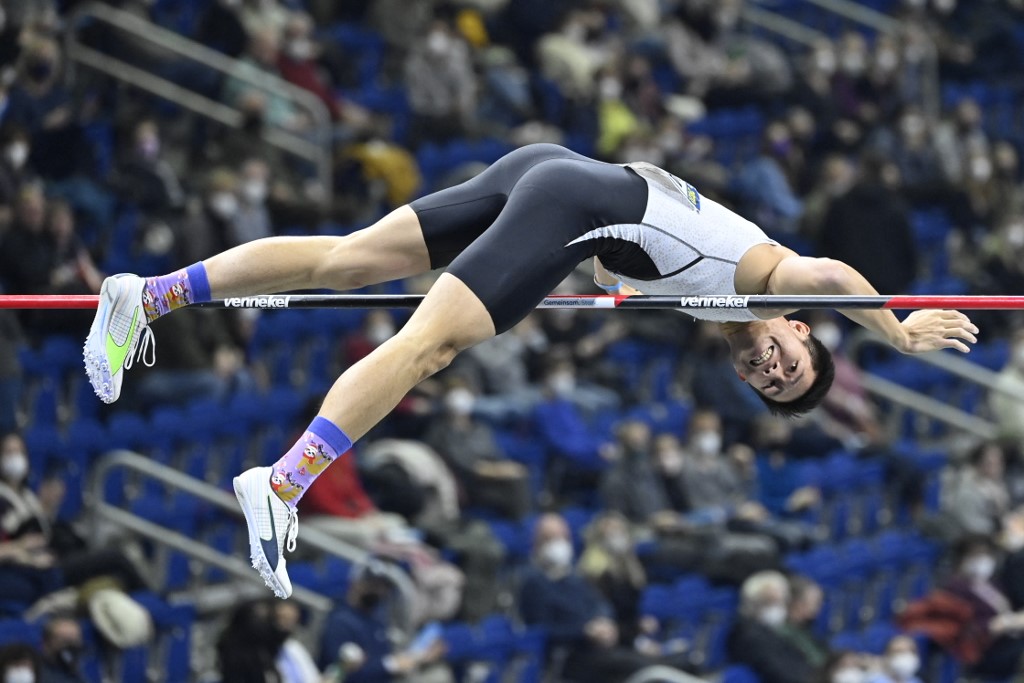EJ Obiena remains a global force despite controversy

The Philippines’ Ernest John Obiena competes during the men’s pole vault event of the ISTAF indoor athletics meeting in Berlin on February 4, 2022. (Photo by John MACDOUGALL / AFP)
Ernest John Obiena saw action for the first time since his war with the Philippine athletics federation erupted back home, and showed he can hold his ground among the world’s best despite jumping with a heavy heart.
But for how long he can represent the country without the blessings of the Philippine Athletics Track and Field Association (Patafa) remains anybody’s guess.
Obiena showed that he has moved on from a knee injury and the turmoil hounding his career when he checked in fourth in the recent ISTAF Indoor pole vault competitions in Berlin, Germany. He cleared 5.70 meters but failed to match his personal best of 5.81m.
It was the first time the 26-year-old competed after being booted out of the national team for alleged failure to pay his Ukrainian coach, Vitaly Petrov, on time, an accusation that the 84-year-old mentor admitted but later on denied on paper.
As expected, Swedish world record holder and reigning Olympic champion Armand “Mondo” Duplantis ruled the meet with a leap of 6.03 meters. American KC Lightfoot was second at 5.92m and German Oleg Zernikel third with an effort of 5.81.
Obiena won the same event last year—when Duplantis wasn’t around—and set a then national record of 5.80m.
But former Philippine Olympic Committee (POC) chair and now weightlifting president Monico Puentevella said Obiena is “on his own,” since his association disowned him. Meaning, he won’t be able to obtain money from the government and secure an official blessing to enter international meets that require his mother federation’s endorsement.
‘Biggest loser’
He cited Republic Act No. 6847 Section 13, paragraph 4, prohibiting the Philippine Sports Commission (PSC) from supporting athletes not recognized by their own national sports associations (NSAs).
The PSC, though, has in the past supported athletes outside of the NSAs umbrella for as long they represent the country.
“He (Obiena) is ultimately the biggest loser here—due to his advisers and patrons—he will be on his own,” said Puentevella, who is also a former PSC commissioner. “It’s a pity, because he doesn’t deserve this. For the sports officials involved, let’s not allow this to happen.”
Puentevella said Obiena’s stint in the Hanoi Southeast Asian Games (SEAG) is also questionable, especially if the organizers insist on a Patafa endorsement.
POC president Bambol Tolentino had previously claimed Obiena can compete in the SEAG using POC’s blessings, and that he would get financial support from the private sector. Tolentino didn’t reply to a recent request for comment.
“This will be a good test for the POC, the IF (World Athletics) and the IOC (International Olympic Committee),” said Puentevella. “This is why I was admonishing Tolentino and (Patafa president Philip Ella) Juico to sit down and decide in the spirit of sportsmanship.”
Tasted it before
Juico has been declared persona non grata by the POC, which means the body doesn’t recognize him as the the country’s track and field head, although it continues to acknowledge the existence of the Patafa itself.
The power interplay between the international federation and the NSAs happened in the 2005 SEA Games held here—and it didn’t end well for the Philippines.
The Philippines, whose cage NSA then was the Fiba-suspended Basketball Association of the Philippines, failed to stage basketball competitions despite the POC’s efforts to hold the country’s national pastime on home soil.
And in the 2009 Laos edition, Filipino cyclists endorsed by the POC were not allowed to compete because organizers only recognized the lone athlete sanctioned by the Integrated Cycling Federation of the Philippines led by Tolentino.
